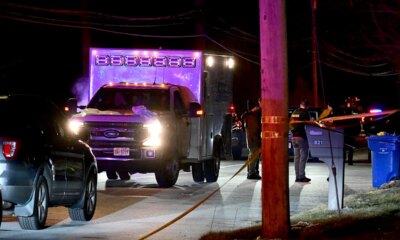California
California must stop law that would authorize placing pregnant women in solitary confinement

California is often hailed as a leader amongst states on progressive issues, particularly those related to women’s rights. Yet California is now on the verge of passing a law that facilitates placing pregnant women in solitary confinement. As someone who experienced the dehumanizing and degrading effects of being placed in solitary confinement while pregnant, I feel compelled to speak up and speak out.
I was arrested when I was six months pregnant, and placed into solitary confinement. When I was taken to court my arms were shackled to my waist, despite the fact that I was pregnant. When I gave birth I was handcuffed to the hospital bed, and treated like I was less than human. Giving birth can be one of the most beautiful and sacred experiences a person can have, yet for me it became a dark and degrading experience because of how I was treated.
Across the world, in all different countries and cultures, pregnant women are viewed as a symbol of life, and are cared for, accommodated, honored and respected. Yet in California jails and prisons, placing them in isolation is somehow viewed as acceptable. California has no law on the books that prevent pregnant women from being placed in solitary confinement, a practice that most of the enlightened world views as a form of torture.
What is perhaps most shocking to learn, is that attempts to legislate protections for pregnant women have not only been undermined, but they have been transformed from a ban on placing pregnant women in solitary confinement, to legislation that facilitates this placement for up to five days, with no medical or third party oversight.
I am referring to AB 2527, a bill by Asm. Bauer-Kahan that started out as a blanket ban on the use of solitary confinement for pregnant women in jails and prisons. Speaking about the bill, Asm. Bauer-Kahan was quoted as saying: “To be pregnant, to remain healthy, I really, truly believe that restrictive housing shouldn’t be a part of the equation.”
Just days later, Bauer-Kahan accepted amendments by correctional authorities that fundamentally altered the bill from ending solitary confinement for pregnant women in jails and prisons, to empowering CDCR to place pregnant women in solitary for up to five days based on when there is a security concern.
To be clear, the legislature is proposing solitary confinement if a pregnant woman, and an unborn child, is facing a security concern. They are not providing a safe alternative to solitary, such as a trauma informed unit that can house a pregnant woman individually, but provide them with guaranteed time out of cell, and access to medical care and programming. Instead the proposed legislation places complete power in the hands of CDCR, without even requiring the development of a medical plan, or a cumulative limit to how many five day stretches of isolation can occur in a particular period.
The bill also completely eliminated all protection to pregnant women in county jails, so it would not have applied to me. Based on available information, instead the supposed “protections” of AB 2527 would apply to seven people in the entire state of California.
These amendments all took place during a period where the legislature quietly prevented the California Mandela Act from being sent to the desk of Governor Newsom. The Mandela Act twice received broad support in the legislature, and included a provision that would completely eliminate the use of solitary confinement for pregnant women in jails, prison and private detention facilities.
Now California appears to be moving backwards on this issue. Why? Apparently to send a bill that purports to care about pregnant women to Governor Newsom’s desk, in order for him to turn them into a tool to undermine real conversations for change.
This past week, I attended the military graduation of my son, who was born while I was in solitary confinement. Since my incarceration I have started a successful business, become an advocate, and am in the process of finishing my college degree. I am proud to reflect on my own resilience through the face of adversity, and honor my the strength that both my son and I have as survivors of solitary confinement. This reflection also includes a commitment to prevent what happened to me from ever happening to anyone else in California.
Cynthia Mendoza is a formerly incarcerated advocate and solitary survivor and is currently completing her education at California State University, Los Angeles

California
California’s exodus isn’t just billionaires — it’s regular people renting U-Hauls, too

It isn’t just billionaires leaving California.
Anecdotal data suggest there is also an exodus of regular people who load their belongings into rental trucks and lug them to another state.
U-Haul’s survey of the more than 2.5 million one-way trips using its vehicles in the U.S. last year showed that the gap between the number of people leaving and the number arriving was higher in California than in any other state.
While the Golden State also attracts a large number of newcomers, it has had the biggest net outflow for six years in a row.
Generally, the defectors don’t go far. The top five destinations for the diaspora using U-Haul’s trucks, trailers and boxes last year were Arizona, Nevada, Oregon, Washington and Texas.
California experienced a net outflow of U-Haul users with an in-migration of 49.4%, and those leaving of 50.6%. Massachusetts, New York, New Jersey and Illinois also rank among the bottom five on the index.
U-Haul didn’t speculate on the reasons California continues to top the ranking.
“We continue to find that life circumstances — marriage, children, a death in the family, college, jobs and other events — dictate the need for most moves,” John Taylor, U-Haul International president, said in a press statement.
While California’s exodus was greater than any other state, the silver lining was that the state lost fewer residents to out-of-state migration in 2025 than in 2024.
U-Haul said that broadly the hotly debated issue of blue-to-red state migration, which became more pronounced after the pandemic of 2020, continues to be a discernible trend.
Though U-Haul did not specify the reasons for the exodus, California demographers tracking the trend point to the cost of living and housing affordability as the top reasons for leaving.
“Over the last dozen years or so, on a net basis, the flow out of the state because of housing [affordability] far exceeds other reasons people cite [including] jobs or family,” said Hans Johnson, senior fellow at the Public Policy Institute of California.
“This net out migration from California is a more than two-decade-long trend. And again, we’re a big state, so the net out numbers are big,” he said.
U-Haul data showed that there was a pretty even split between arrivals and departures. While the company declined to share absolute numbers, it said that 50.6% of its one-way customers in California were leaving, while 49.4% were arriving.
U-Haul’s network of 24,000 rental locations across the U.S. provides a near-real-time view of domestic migration dynamics, while official data on population movements often lags.
California’s population grew by a marginal 0.05% in the year ending July 2025, reaching 39.5 million people, according to the California Department of Finance.
After two consecutive years of population decline following the 2020 pandemic, California recorded its third year of population growth in 2025. While international migration has rebounded, the number of California residents moving out increased to 216,000, consistent with levels in 2018 and 2019.
Eric McGhee, senior fellow at the Public Policy Institute of California, who researches the challenges facing California, said there’s growing evidence of political leanings shaping the state’s migration patterns, with those moving out of state more likely to be Republican and those moving in likely to be Democratic.
“Partisanship probably is not the most significant of these considerations, but it may be just the last straw that broke the camel’s back, on top of the other things that are more traditional drivers of migration … cost of living and family and friends and jobs,” McGhee said.
Living in California costs 12.6% more than the national average, according to the U.S. Bureau of Economic Analysis. One of the biggest pain points in the state is housing, which is 57.8% more expensive than what the average American pays.
The U-Haul study across all 50 states found that 7 of the top 10 growth states where people moved to have Republican governors. Nine of the states with the biggest net outflows had Democrat governors.
Texas, Florida and North Carolina were the top three growth states for U-Haul customers, with Dallas, Houston and Austin bagging the top spots for growth in metro regions.
A notable exception in California was San Diego and San Francisco, which were the only California cities in the top 25 metros with a net inflow of one-way U-Haul customers.
California
California loses $160M for delaying revocation of 17,000 commercial driver’s licenses for immigrants
California will lose $160 million for delaying the revocations of 17,000 commercial driver’s licenses for immigrants, federal transportation officials announced Wednesday.
Transportation Secretary Sean Duffy already withheld $40 million in federal funding because he said California isn’t enforcing English proficiency requirements for truckers.
The state notified these drivers in the fall that they would lose their licenses after a federal audit found problems that included licenses for truckers and bus drivers that remained valid long after an immigrant’s visa expired. Some licenses were also given to citizens of Mexico and Canada who don’t qualify. More than one-quarter of the small sample of California licenses that investigators reviewed were unlawful.
But then last week California said it would delay those revocations until March after immigrant groups sued the state because of concerns that some groups were being unfairly targeted. Duffy said the state was supposed to revoke those licenses by Monday.
Duffy is pressuring California and other states to make sure immigrants who are in the country illegally aren’t granted the licenses.
“Our demands were simple: follow the rules, revoke the unlawfully-issued licenses to dangerous foreign drivers, and fix the system so this never happens again,” Duffy said in a written statement. “(Gov.) Gavin Newsom has failed to do so — putting the needs of illegal immigrants over the safety of the American people.”
Newsom’s office did not immediately respond after the action was announced Wednesday afternoon.
After Duffy objected to the delay in revocations, Newsom posted on X that the state believed federal officials were open to a delay after a meeting on Dec. 18. But in the official letter the Federal Motor Carrier Safety Administration sent Wednesday, federal officials said they never agreed to the delay and still expected the 17,000 licenses to be revoked by this week.
Enforcement ramped up after fatal crashes
The federal government began cracking down during the summer. The issue became prominent after a truck driver who was not authorized to be in the U.S. made an illegal U-turn and caused a crash in Florida that killed three people in August.
Duffy previously threatened to withhold millions of dollars in federal funding from California, Pennsylvania, Minnesota, New York, Texas, South Dakota, Colorado, and Washington after audits found significant problems under the existing rules, including commercial licenses being valid long after an immigrant truck driver’s work permit expired. He had dropped the threat to withhold nearly $160 million from California after the state said it would revoke the licenses.
Federal Motor Carrier Safety Administration Administrator Derek Barrs said California failed to live up to the promise it made in November to revoke all the flawed licenses by Jan. 5. The agency said the state also unilaterally decide to delay until March the cancellations of roughly 4,700 additional unlawful licenses that were discovered after the initial ones were found.
“We will not accept a corrective plan that knowingly leaves thousands of drivers holding noncompliant licenses behind the wheel of 80,000-pound trucks in open defiance of federal safety regulations,” Barrs said.
Industry praises the enforcement
Trucking trade groups have praised the effort to get unqualified drivers who shouldn’t have licenses or can’t speak English off the road. They also applauded the Transportation Department’s moves to go after questionable commercial driver’s license schools.
“For too long, loopholes in this program have allowed unqualified drivers onto our highways, putting professional truckers and the motoring public at risk,” said Todd Spencer, president of the Owner Operator Independent Drivers Association.
The spotlight has been on Sikh truckers because the driver in the Florida crash and the driver in another fatal crash in California in October are both Sikhs. So the Sikh Coalition, a national group defending the civil rights of Sikhs, and the San Francisco-based Asian Law Caucus filed a class-action lawsuit on behalf of the California drivers. They said immigrant truck drivers were being unfairly targeted.
Immigrants account for about 20% of all truck drivers, but these non-domiciled licenses immigrants can receive only represent about 5% of all commercial driver’s licenses or about 200,000 drivers. The Transportation Department also proposed new restrictions that would severely limit which noncitizens could get a license, but a court put the new rules on hold.
California
California officials facing backlash in aftermath of Palisades fire one year later | Fox News Video

-

 Detroit, MI5 days ago
Detroit, MI5 days ago2 hospitalized after shooting on Lodge Freeway in Detroit
-

 Dallas, TX3 days ago
Dallas, TX3 days agoDefensive coordinator candidates who could improve Cowboys’ brutal secondary in 2026
-

 Technology2 days ago
Technology2 days agoPower bank feature creep is out of control
-

 Health4 days ago
Health4 days agoViral New Year reset routine is helping people adopt healthier habits
-

 Nebraska1 day ago
Nebraska1 day agoOregon State LB transfer Dexter Foster commits to Nebraska
-

 Politics4 days ago
Politics4 days agoDan Bongino officially leaves FBI deputy director role after less than a year, returns to ‘civilian life’
-

 Nebraska2 days ago
Nebraska2 days agoNebraska-based pizza chain Godfather’s Pizza is set to open a new location in Queen Creek
-

 Louisiana3 days ago
Louisiana3 days agoInternet company started with an antenna in a tree. Now it’s leading Louisiana’s broadband push.


















